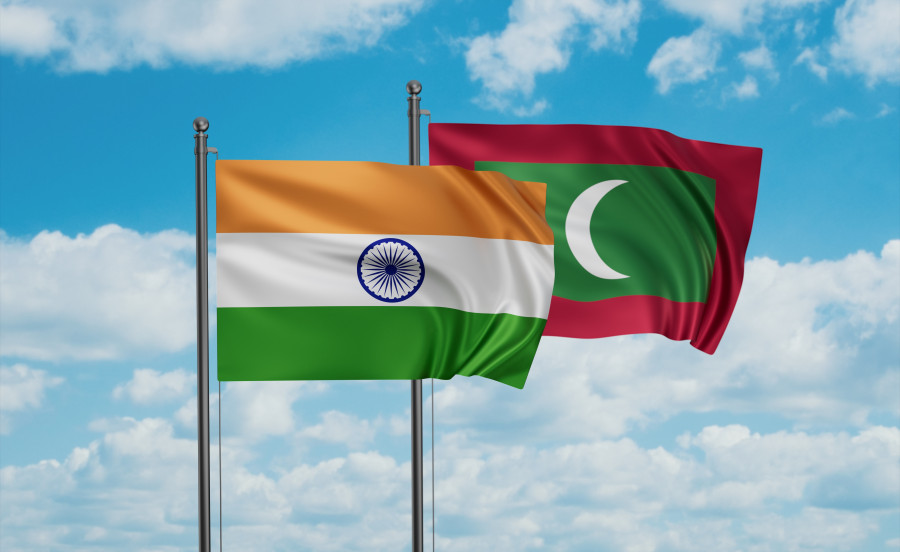Columns
Balancing India-Maldives ties
The Maldives has benefitted from its attempt to expand foreign relations.
Smruti S Pattanaik
On the sidelines of the Conference of the Parties (COP28) to the United Nations Framework Convention on Climate Change in Dubai, United Arab Emirates, on December 2, India’s Prime Minister Narendra Modi met with Mohammad Muizzu, the newly elected President of the Maldives. This was the first meeting of the two leaders, which is significant in the context of Muizzu’s longstanding “India out” campaign. The campaign aims to remove the 77 Indian military personnel stationed at Addu Atoll, the southernmost island in the Maldives.
Although Modi was invited to Muizzu’s swearing-in ceremony in the Maldives, he could not attend due to a hectic assembly election campaign in India. Kiren Rijiju, a central Cabinet minister, represented Modi, and President Xi Jinping’s Special Envoy and State Councilor, Shen Yiqin, represented China in the ceremony.
The new Maldivian president has reiterated that he will put his country’s interest first, but he is also aware of India’s and China’s investments in Maldives. Yet, extracting himself from this geopolitical binary, Muizzu made Turkey his first foreign destination after his swearing-in ceremony, ostensibly to get the Turkish to invest in Maldives. Turkey, under President Erdoğan, is trying to rally the Muslim countries to showcase none other than Erdoğan himself as a leader of the Ummah.
The India factor
After taking the oath, Muizzu said he would see all the foreign forces out of the country. “Using the instrument of diplomacy, I will ensure that this country has no foreign military presence on its soil,” Muizzu said in the presence of Rijiju.
Though the Indian security presence is mired in controversy between India and the Maldives (which is not new), India held an impressive record in showcasing its mission in the past five years. For instance, 500 medical evacuations have been carried out by Indian personnel, saving 523 Maldivian lives, and more than 450 multifaceted missions have been carried out to safeguard the maritime security of the Maldives. As India watches the new administration in the island nation closely, an invitation to Muizzu to visit India would be pending for an appropriate occasion.
While highlighting 119 billion Maldivian Rupaiyah as the outstanding debt of the country, the President said in his inaugural speech he would work to boost tourism—the mainstay of the economy of Maldives—and have two Integrated Development Zones and seven urban centres to develop the country. India tops the list of tourist sources for the Maldives. Since 2019, more than 2,600 Maldivians have travelled to India to participate in various capacity-building programmes; 155 of its 241 officers were trained in India on different streams in 2022, according to the Maldivian Ministry of Defence.
Though Muizzu has said he had already spoken to India about withdrawing troops, keeping in line with his earlier promise, no confirmation has come from India. According to India’s Ministry of External Affairs, the two countries have agreed to set up a core group to deepen their partnership. How the issue has been raised, giving it a political colour and sovereignty issue, has certainly annoyed India. Moreover, the issue of India’s troop presence as trainers for the Maldives National Defence Force is part of the India-Maldives defence and security partnership apart from the annual defence dialogue. This is one issue the opposition has been raising since 2018, as they see Abu Solih as India’s protégée.
India has funded several projects in the Maldives under the Development Partnership programme, notably the $500 Greater Male Connectivity Project and teh redevelopment of the Hanimaadhoo International Airport and the Gan International Airport, housing projects and several other grant projects. A direct shipping service between Thoothukudi (formerly Tuticorin) and Maldives now exists for trade and commerce. While many analysts look at Muizzu’s victory benefitting China over India, it must be underlined that India’s investment and trade with the Maldives has grown and will be expanded further. Therefore, India’s relationship with the Maldives will stand on its own and cannot be considered only as a response to China’s geopolitical contestation. Be it the 1988 coup d'état attempt, the recent drinking water crisis, or sending vaccines as part of “Vaccine Maitri”, India has remained a first responder in the region.
China and Indian Ocean
China’s interest in the Indian Ocean has expanded over time as it has emerged as a dominant player commensurate with its military and economic prowess. Since Xi’s visit to the Maldives, China’s footprint has increased in the island count. Part of its strategy is to float parallel organisations to bolster its relationship with the South Asian neighbourhood except India. Its relationship with the Maldives forms part of this larger strategy. The China-South Asia Cooperation Forum (CSACF) and the China-Indian Ocean Region Forum on Development Cooperation (CIORFDC) are the two important forums China uses to foster closer ties with India’s neighbours. The newly elected Vice President of Maldives, Uz Hussain Mohamed Latheef, left for Kunming, China, to attend the Second CIORFDC, attended by 19 other Indian Ocean Rim countries. Last year, the Maldives, along with Australia, declined official participation in this forum, and Bangladesh also abstained, citing geo-political issues.
Multilateralising foreign policy
As the Maldives aims to diversify its foreign policy to go beyond India and the United States, the new government’s interest in fetching investment from the Middle East also has a larger ideological dimension, given the country’s dominant Muslim population. Saudi Arabia and the UAE are also engaged with the Maldives and have invested in commercial ventures. However, their ideological influence over the dominant Muslim population has been interpreted by the Maldivian opposition as manifesting in growing Wahabism. Strengthening the capacity of the Maldives Coastguard, building sub-regional centers, the new building of the Maldives Maritime Rescue Coordination Centre with a marine pollution response vessel built by Japan and Vessels. Similarly, the United States also remains an important player.
The Maldives has benefitted from its attempt to expand its foreign relations. Yet, its relationship with India has been close. India will closely watch how Muizzu navigates the choppy waters of diplomacy to bring a balance between his electoral rhetoric, Maldivian security requirement and its relations with New Delhi.




 8.75°C Kathmandu
8.75°C Kathmandu















